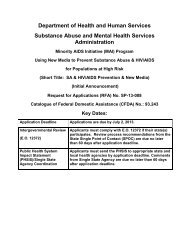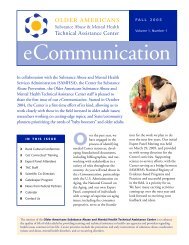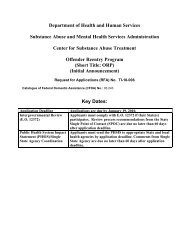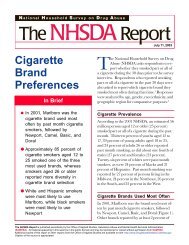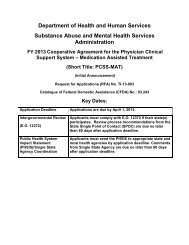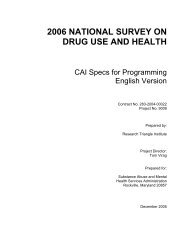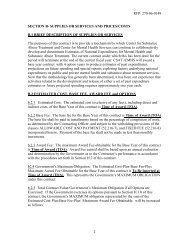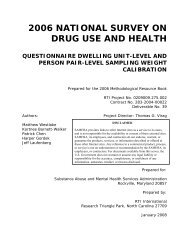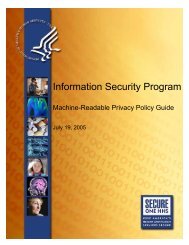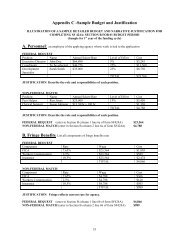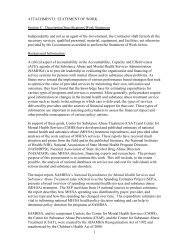- Page 1 and 2:
2003 National Survey on Drug Use an
- Page 3 and 4:
Table of Contents Chapter Page List
- Page 5 and 6:
Table of Contents (continued) Chapt
- Page 7 and 8:
List of Tables (continued) Table 6.
- Page 9 and 10:
List of Tables (continued) Table 7.
- Page 11 and 12:
List of Exhibits Exhibit 2.1 2003 N
- Page 13 and 14:
1. Introduction The 2003 National S
- Page 15 and 16:
2. Sampling and Counting/Listing Op
- Page 17 and 18:
segment it was apparent the segment
- Page 19 and 20:
working in and around their campuse
- Page 21 and 22:
Exhibit 2.1 2003 NSDUH Sample Desig
- Page 23 and 24:
Table 2.1 Sampling Summary of 2003
- Page 25 and 26:
3. Data Collection Staffing The mag
- Page 27 and 28:
The work of an interviewer requires
- Page 29 and 30:
quarter to quarter varied, so FSs h
- Page 31 and 32: Exhibit 3.1 NSDUH Management Chart
- Page 33 and 34: Exhibit 3.3 Flow of FI Recruiting A
- Page 35 and 36: Exhibit 3.3 Flow of FI Recruiting A
- Page 37 and 38: 4. Preparation of Survey Materials
- Page 39 and 40: • NSDUH Guide Book: This guideboo
- Page 41 and 42: • Quality Control Forms specifica
- Page 43 and 44: • Supplies to be used during trai
- Page 45 and 46: Switching the Industry and Occupati
- Page 47 and 48: Exhibit 4.1 2003 Newton Updates (co
- Page 49 and 50: Exhibit 4.1 2003 Newton Updates (co
- Page 51 and 52: Exhibit 4.2 2003 CAI Changes (conti
- Page 53 and 54: Exhibit 4.2 2003 CAI Changes (conti
- Page 55: Exhibit 4.2 2003 CAI Changes (conti
- Page 58 and 59: All trainees were required to pass
- Page 60 and 61: 5.2.3.2 Day 2 Day 2 included a gene
- Page 62 and 63: • Through the developed training
- Page 64 and 65: consisted of an FS Team Meeting in
- Page 66 and 67: Table 5.2 Results from Home Study a
- Page 68 and 69: Exhibit 5.1 Daily Trainee Evaluatio
- Page 70 and 71: Exhibit 5.2 Mentoring Instructions
- Page 72 and 73: Exhibit 5.2 Mentoring Instructions
- Page 74 and 75: Exhibit 5.2 Mentoring Instructions
- Page 76 and 77: included in the Showcard Booklet fo
- Page 78 and 79: usually attributed to breakoffs occ
- Page 80 and 81: participation. Supervisors sometime
- Page 84 and 85: Table 6.1 2003 NSDUH CAI Audit Trai
- Page 86 and 87: Table 6.3 2003 NSDUH CAI Audit Trai
- Page 88 and 89: Table 6.5 2003 NSDUH CAI Audit Trai
- Page 90 and 91: Table 6.7 2003 NSDUH CAI Audit Trai
- Page 92 and 93: Table 6.9 2003 NSDUH CAI Audit Trai
- Page 94 and 95: Table 6.11 2003 NSDUH CAI Audit Tra
- Page 96 and 97: Table 6.13 2003 NSDUH CAI Audit Tra
- Page 98 and 99: Table 6.15 2003 NSDUH CAI Audit Tra
- Page 100 and 101: Table 6.17 2003 NSDUH CAI Audit Tra
- Page 102 and 103: Table 6.19 2003 NSDUH CAI Audit Tra
- Page 104 and 105: Table 6.21 2003 NSDUH CAI Audit Tra
- Page 106 and 107: Table 6.23 2003 NSDUH CAI Audit Tra
- Page 108 and 109: Table 6.25 2003 NSDUH CAI Audit Tra
- Page 110 and 111: Table 6.27 2003 NSDUH CAI Audit Tra
- Page 112 and 113: Table 6.29 2003 NSDUH CAI Audit Tra
- Page 114 and 115: Table 6.31 2003 NSDUH CAI Audit Tra
- Page 116 and 117: 104
- Page 118 and 119: Tables 7.18 and 7.19 present, in al
- Page 120 and 121: Table 7.2 2003 Screening Results, b
- Page 122 and 123: Table 7.4 2003 Screening Results, b
- Page 124 and 125: Table 7.6 2003 Screening Results
- Page 126 and 127: Table 7.7 2003 Screening Results
- Page 128 and 129: 116 Table 7.8 2003 Screening Result
- Page 130 and 131: Table 7.10 2003 Screening Results
- Page 132 and 133:
Table 7.12 2003 Screening Results
- Page 134 and 135:
Table 7.14 and 7.15 2003 Screening
- Page 136 and 137:
124 Table 7.14 and 7.15 2003 Screen
- Page 138 and 139:
126 Table 7.14 and 7.15 2003 Screen
- Page 140 and 141:
128 Table 7.14 and 7.15 2003 Screen
- Page 142 and 143:
130 Table 7.14 and 7.15 2003 Screen
- Page 144 and 145:
132 Table 7.14 and 7.15 2003 Screen
- Page 146 and 147:
134 Table 7.14 and 7.15 2003 Screen
- Page 148 and 149:
136 Table 7.14 and 7.15 2003 Screen
- Page 150 and 151:
138 Table 7.14 and 7.15 2003 Screen
- Page 152 and 153:
140 Table 7.14 and 7.15 2003 Screen
- Page 154 and 155:
142 Table 7.14 and 7.15 2003 Screen
- Page 156 and 157:
144 Table 7.14 and 7.15 2003 Screen
- Page 158 and 159:
146 Table 7.14 and 7.15 2003 Screen
- Page 160 and 161:
148 Table 7.14 and 7.15 2003 Screen
- Page 162 and 163:
Table 7.17 2003 Interview Results,
- Page 164 and 165:
152 Table 7.18 and 7.19 2003 Interv
- Page 166 and 167:
154 Table 7.18 and 7.19 2003 Interv
- Page 168 and 169:
156 Table 7.18 and 7.19 2003 Interv
- Page 170 and 171:
158 Table 7.18 and 7.19 2003 Interv
- Page 172 and 173:
160 Table 7.18 and 7.19 2003 Interv
- Page 174 and 175:
162 Table 7.18 and 7.19 2003 Interv
- Page 176 and 177:
164 Table 7.18 and 7.19 2003 Interv
- Page 178 and 179:
166 Table 7.18 and 7.19 2003 Interv
- Page 180 and 181:
168 Table 7.18 and 7.19 2003 Interv
- Page 182 and 183:
170 Table 7.18 and 7.19 2003 Interv
- Page 184 and 185:
172 Table 7.18 and 7.19 2003 Interv
- Page 186 and 187:
174 Table 7.18 and 7.19 2003 Interv
- Page 188 and 189:
176 Table 7.18 and 7.19 2003 Interv
- Page 190 and 191:
178 Table 7.18 and 7.19 2003 Interv
- Page 192 and 193:
180 Table 7.18 and 7.19 2003 Interv
- Page 194 and 195:
182 Table 7.18 and 7.19 2003 Interv
- Page 196 and 197:
184 Table 7.18 and 7.19 2003 Interv
- Page 198 and 199:
186 Table 7.18 and 7.19 2003 Interv
- Page 200 and 201:
188 Table 7.18 and 7.19 2003 Interv
- Page 202 and 203:
190 Table 7.18 and 7.19 2003 Interv
- Page 204 and 205:
192 Table 7.18 and 7.19 2003 Interv
- Page 206 and 207:
194 Table 7.18 and 7.19 2003 Interv
- Page 208 and 209:
196 Table 7.18 and 7.19 2003 Interv
- Page 210 and 211:
198 Table 7.18 and 7.19 2003 Interv
- Page 212 and 213:
200 Table 7.18 and 7.19 2003 Interv
- Page 214 and 215:
202 Table 7.18 and 7.19 2003 Interv
- Page 216 and 217:
Table 7.20 and 7.21 2003 Interview
- Page 218 and 219:
Table 7.20 and 7.21 2003 Interview
- Page 220 and 221:
Table 7.20 and 7.21 2003 Interview
- Page 222 and 223:
Table 7.20 and 7.21 2003 Interview
- Page 224 and 225:
Table 7.20 and 7.21 2003 Interview
- Page 226 and 227:
Table 7.20 and 7.21 2003 Interview
- Page 228 and 229:
Table 7.20 and 7.21 2003 Interview
- Page 230 and 231:
Table 7.20 and 7.21 2003 Interview
- Page 232 and 233:
Table 7.20 and 7.21 2003 Interview
- Page 234 and 235:
Table 7.20 and 7.21 2003 Interview
- Page 236 and 237:
Table 7.20 and 7.21 2003 Interview
- Page 238 and 239:
Table 7.20 and 7.21 2003 Interview
- Page 240 and 241:
Table 7.20 and 7.21 2003 Interview
- Page 242 and 243:
Table 7.20 and 7.21 2003 Interview
- Page 244 and 245:
Table 7.20 and 7.21 2003 Interview
- Page 246 and 247:
Table 7.20 and 7.21 2003 Interview
- Page 248 and 249:
Table 7.20 and 7.21 2003 Interview
- Page 250 and 251:
Table 7.20 and 7.21 2003 Interview
- Page 252 and 253:
Table 7.20 and 7.21 2003 Interview
- Page 254 and 255:
Table 7.20 and 7.21 2003 Interview
- Page 256 and 257:
Table 7.20 and 7.21 2003 Interview
- Page 258 and 259:
Table 7.20 and 7.21 2003 Interview
- Page 260 and 261:
Table 7.20 and 7.21 2003 Interview
- Page 262 and 263:
Table 7.20 and 7.21 2003 Interview
- Page 264 and 265:
Table 7.20 and 7.21 2003 Interview
- Page 266 and 267:
Table 7.20 and 7.21 2003 Interview
- Page 268 and 269:
Table 7.22 and 7.23 2003 Interview
- Page 270 and 271:
Table 7.22 and 7.23 2003 Interview
- Page 272 and 273:
Table 7.22 and 7.23 2003 Interview
- Page 274 and 275:
Table 7.22 and 7.23 2003 Interview
- Page 276 and 277:
Table 7.22 and 7.23 2003 Interview
- Page 278 and 279:
Table 7.22 and 7.23 2003 Interview
- Page 280 and 281:
Table 7.22 and 7.23 2003 Interview
- Page 282 and 283:
Table 7.22 and 7.23 2003 Interview
- Page 284 and 285:
Table 7.22 and 7.23 2003 Interview
- Page 286 and 287:
Table 7.22 and 7.23 2003 Interview
- Page 288 and 289:
Table 7.22 and 7.23 2003 Interview
- Page 290 and 291:
Table 7.22 and 7.23 2003 Interview
- Page 292 and 293:
Table 7.22 and 7.23 2003 Interview
- Page 294 and 295:
Table 7.22 and 7.23 2003 Interview
- Page 296 and 297:
Table 7.22 and 7.23 2003 Interview
- Page 298 and 299:
Table 7.22 and 7.23 2003 Interview
- Page 300 and 301:
Table 7.22 and 7.23 2003 Interview
- Page 302 and 303:
Table 7.22 and 7.23 2003 Interview
- Page 304 and 305:
Table 7.22 and 7.23 2003 Interview
- Page 306 and 307:
Table 7.22 and 7.23 2003 Interview
- Page 308 and 309:
Table 7.22 and 7.23 2003 Interview
- Page 310 and 311:
Table 7.22 and 7.23 2003 Interview
- Page 312 and 313:
Table 7.22 and 7.23 2003 Interview
- Page 314 and 315:
Table 7.22 and 7.23 2003 Interview
- Page 316 and 317:
Table 7.22 and 7.23 2003 Interview
- Page 318 and 319:
Table 7.22 and 7.23 2003 Interview
- Page 320 and 321:
Table 7.24 2003 Interview Results,
- Page 322 and 323:
Table 7.25 2003 Interview Results,
- Page 324 and 325:
Table 7.25 2003 Interview Results,
- Page 326 and 327:
Table 7.26 2003 Interview Results,
- Page 328 and 329:
Table 7.27 2003 Interview Results,
- Page 330 and 331:
Table 7.27 2003 Interview Results,
- Page 332 and 333:
320 Table 7.28 2003 Interview Resul
- Page 334 and 335:
321-A Table 7.29 2003 Interview Res
- Page 336 and 337:
Table 7.32 2003 English and Spanish
- Page 338 and 339:
Table 7.34 2003 Interviewer's Asses
- Page 340 and 341:
Table 7.36 2003 Interviewer's Asses
- Page 342 and 343:
Table 7.38 2003 Interviewer's Asses
- Page 344 and 345:
8. Quality Control While every step
- Page 346 and 347:
quality errors, and willingness to
- Page 348 and 349:
• Status and Result Code (record
- Page 350 and 351:
8.4.1 In-house Verification Verific
- Page 352 and 353:
Data Quality Team and the FS, RS, a
- Page 354 and 355:
Table 8.1 2003 NSDUH FI Exit Interv
- Page 356 and 357:
Exhibit 8.1 Steps to Maximize Data
- Page 358 and 359:
Exhibit 8.2 2003 NSDUH Field Interv
- Page 360 and 361:
Exhibit 8.2 2003 NSDUH Field Interv
- Page 362 and 363:
Exhibit 8.3. Field Interviewer Exit
- Page 364 and 365:
Exhibit 8.3. Field Interviewer Exit
- Page 366 and 367:
Exhibit 8.3. Field Interviewer Exit
- Page 368 and 369:
Exhibit 8.5 Overview of NSDUH Inter
- Page 370 and 371:
Exhibit 8.6 Quality Control Form (c
- Page 372 and 373:
Exhibit 8.8 Short FI Level Verifica
- Page 374 and 375:
Exhibit 8.9 Short FI Level Verifica
- Page 376 and 377:
Exhibit 8.10 Short FI Level Verific
- Page 378 and 379:
Appendix A New-to-Project Home Stud
- Page 380 and 381:
TO: FROM: SUBJECT: New-to-Project F
- Page 382 and 383:
Because of the importance we attach
- Page 384 and 385:
Appendix B New-to-Project Home Stud
- Page 386 and 387:
FI NAME: __________________________
- Page 388 and 389:
11. What is the Block Listing Map u
- Page 390 and 391:
24. It is possible for the HU scree
- Page 392 and 393:
Questions 38-40: Described below ar
- Page 394 and 395:
2003 National Survey on Drug Use an
- Page 396 and 397:
16. If the screen on your Newton ha
- Page 398 and 399:
Appendix C Veteran Home Study Cover
- Page 400 and 401:
DATE: December 4, 2002 TO: FROM: 20
- Page 402 and 403:
The 2003 Veteran Training Conferenc
- Page 404 and 405:
Items You Must Bring to Training 20
- Page 406 and 407:
Appendix D Veteran Home Study Exerc
- Page 408 and 409:
2003 NSDUH Veteran Training Confere
- Page 410 and 411:
Q9. Which of the following is NOT t
- Page 412 and 413:
Q24. There is no wrong answer to th
- Page 414 and 415:
Appendix E Verification Scripts
- Page 416 and 417:
Verification Script for Code 70 Gen
- Page 418 and 419:
Screening Script: >UNDR18AA< In rec
- Page 420 and 421:
We would like to ask this teen a fe
- Page 422 and 423:
A1B< >A1C< >A2A< >A2AELB1< Were you
- Page 424 and 425:
A4< Did you complete a short set of
- Page 426 and 427:
ELB1A< >MPAY< >MPAY2< Would you ple
- Page 428 and 429:
Verification Script for Code 30 Gen
- Page 430 and 431:
B1A< >B1AELB1< >B1B< >B1C< How were
- Page 432 and 433:
B2< According to our interviewer, t
- Page 434 and 435:
Screening Information Provided for
- Page 436 and 437:
NORES2C< >SPEAKC< I was given this
- Page 438 and 439:
NORES3C2< >C1A< I was given this te
- Page 440 and 441:
C2C< >C2ELB1< >IPRFC< >ELB1C< >DONE
- Page 442 and 443:
Screening Script: >INTRO1D< May I s
- Page 444 and 445:
SPEAKD2< May I speak with this pers
- Page 446 and 447:
D1_13B< >D1_13C< >D1_18A< >D1_18B<
- Page 448 and 449:
D1_26D< >D1_26E< >D1_26F< >D2< (Wil
- Page 450 and 451:
Appendix F Census Bureau Industry a
- Page 452 and 453:
Industry and Occupation Coding Over
- Page 454 and 455:
Table F.2 2003 NSDUH Industry and O



